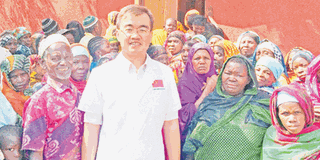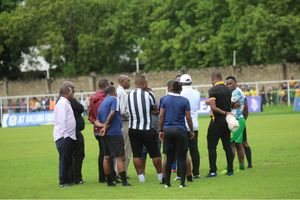Rural people in dire need of medical care

Song Tao during one of his medical camp in Tanzania|PHOTO|COURTESY
What you need to know:
- I am drawing this experience from the activities that we, as part of the Chinese doctors’ team, have been carrying out in rural parts of the country.
- As a team, we were supplying medicine in areas such as Nyambono village and Kwikuba village in Musoma and Ruangwa in Lindi and Same District, based in the Kilimanjaro Region.
Having worked as a medical volunteer in Tanzania for eight years now, I can attest that people in rural areas are in dire need of medical care.
I am drawing this experience from the activities that we, as part of the Chinese doctors’ team, have been carrying out in rural parts of the country.
As a team, we were supplying medicine in areas such as Nyambono village and Kwikuba village in Musoma and Ruangwa in Lindi and Same District, based in the Kilimanjaro Region.
As we supplied medical equipment, we came across patients who had stayed for so long without seeing a doctor—to be treated for diseases such as malaria.
If not treated on time, patients suffering from malaria usually die—this is the reality we encountered during our service.
We came across cases of patients grappling with lifestyle diseases, such as hypertension and diabetes. They remained untreated for a very long time.
Moreover, there were no programs to prevent such diseases, despite the fact that we all know prevention is better than cure.
I do believe that it’s high time we invested in rural healthcare, by spreading awareness about such diseases.
Let’s educate people that consuming too much salt is harmful.
People need to also learn that doing regular exercises reduces the risk of lifestyle diseases.
We witnessed patients who tested their blood pressure for the first time, especially when they were visited by our team of volunteers.
To their surprise, their blood pressure was abnormally high. But they didn’t know before. It dawned on us that if the people had general knowledge on their blood pressure, it would have been helpful.
In rural areas, villagers face the challenge of shortage of doctors and medicine. For example, there is only one doctor in Nyambono village, who takes care of over 3000 villagers.
Yet, the use of mobile phones is now popular in the villages. It’s here that I do believe that stakeholders can sit down and plan on how to harness the power of mobile phones in provision of medical consultations among the villagers.
People in the rural areas also believe in traditional medicine, especially in Kilimanjaro where we have partly worked.
If we make full use of the well-researched traditional and herbal medicines in those areas, the villagers can get more access to the treatment.
At the same time, money can be saved. This is because; there will be less importation of medicine from other countries. This is where industrialisation of the pharmaceutical sector comes in.
Then, good sanitation habits should be cultivated among the people in the rural areas and this can be useful in the prevention of cholera. Mobile clinics in the rural areas are also necessary sometimes, only for normal health checkups.
So, villagers can get more chance to know their health conditions early.
Malnutrition is also widespread in rural villages, especially the children.
It would be important to help parents understand that if they find their children underweight, they should balance the diet or even seek the intervention of health experts.
The author is an Administrative Secretary and interpreter of China Medical Team working in Tanzania.




